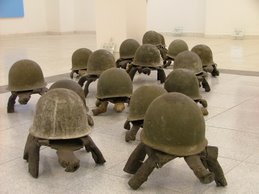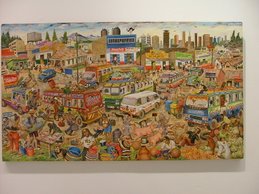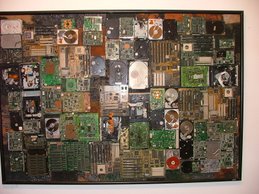Ngugi wa Thiongo drew international critical attention to writing in African languages. Gakaara wa Wanjau, who passed in 2001, preceded Ngugi as a writer, editor, publisher, political activist and detainee for the cause of Gikuyu language, literature and culture. We examine the life and times of this Gikuyu literary icon.
Gakaara wa Wanjau was an unrivalled Gikuyu literary icon. He was not only the most prolific Kenyan author, but also probably a unique case in Africa of an author and publisher in an African language whose activity never ceased in the last fifty years.
He started writing in the mid-forties and since then, he has published a large number of booklets about the Gikuyu customs, culture and language as well as Kenyan politics and history. He also published many pieces of short stories and several Gikuyu readers for primary school which have been included on the official school syllabus.
"Gakaara's works are examples of highly independent literary production in that from the very beginning of his career as a writer, he published his own books and since the early sixties, has also printed them with his own press," writes Cristiana Pugliese, a lecturer at the English Department of the University of Zimbabwe, who did extensive research on his work.
Gakaara was born at Gakanduini village, near Tumutumu, in 1921. His father, who was a minister of the Church of Scotland Mission, who belonged to the christened and educated Gikuyu elite ensured that his son was well read also. He sent his son to Alliance High School in 1939, where he was a classmate to three future ministers namely Paul Ngei, Jeremiah Nyaga and the late Ronald Ngala.
In 1940, shortly after the arrival of Carey Francis Gakaara was expelled after he and other students had defied and demonstrated against the new master. In December- the same year, he joined the army as a clerical officer.
After the war, he and a group of friends founded the African Book Writers Limited, which was the first company of writers in Kenya. In 1946, Gakaara published his first narrative. It was a short story called Uhoro wa Ugurani (Marriage Procedures), which sold ten thousand copies and became very popular. He co-authored another popular piece– Riua Ritanathua (Before Sunset), before he ventured into political activism.
In 1948, he moved to Nakuru to work as a clerk for a British firm, where came face to face with the colonial oppression and exploitation. He was shocked by the "virtual slavery to which African workers were subjected" that he wrote a political pamphlet in Kiswahili to denounce the situation.
He wrote Roho ya Kiume na Bidii kwa Mwafrika (The Spirit of Manhood and Perseverance for the African), which marked his entry into political activism. Later on, the piece became the main ground for his detention by the colonial government.
At the beginning of 1951, he moved to Nairobi, which was the centre of militant politics, where he became an activist. He worked as a clerk for a short time before turning to writing and publishing full-time.
His activities in the years immediately preceding the declaration of the State of Emergency was in the then popular vernacular press.
In February 1952, he started publishing his own monthly paper called Waigua Atia? (What's the News). It became popular and he opened his offices in Nairobi. He got involved in the movement and in March 1952, he took his first oath and a second one in September of the year. He dropped his Christian name Jonah and resorted to his Gikuyu names.
Apart from editing his magazine Waigua Atia?, Gakaara was very active as a writer and publisher. In 1951, he re-printed his first work of fiction this time calling it Ngwenda Unjurage (I Want You to Kill Me). The same year, he wrote three short stories Ihu ni Ria U (Who is Responsible for her Pregnancy?), O Kirima Ngagua (To Whatever Destination) and Murata wa Mwene (My Bosom Friend).
He produced his first work of Gikuyu poetry Marebeta Ikumi ma Wendo (Ten Love Poems) and a political pamphlet called Kienyu kia Ngai Kirima-ini gia Tumutumu.
In February 1952, Gakaara Book Service was finally registered and he embarked on publishing numerous pieces of work. His first piece was a Gikuyu translation of his first political pamphlet Roho ya Kiume na Bidii kwa Mwafrika under the title Mageria No mo Mahota (Success Comes with Repeated Effort).
In August 1952, he composed and published a political Creed modelled on the Christian Creed called Witikio wa Gikuyu na Mumbi (The Creed of Gikuyu and Mumbi). It was sold at oathing ceremonies to initiates.
He wrote and published carefully crafted and paraphrased Christian hymns to fuel the independence struggle. He wrote and compiled two books Nyimbo cia Gikuyu na Mumbi (Songs of Gikuyu and Mumbi) and Nyimbo cia Ciana cia Gikuyu na Mumbi (Songs of the Children of Gikuyu and Mumbi).
His political writings led to his arrest on October 20, 1952, when the state of emergency was declared. Gakaara was amongst the first to be picked alongside other nationalist who formed the Kapenguria six.
After he was convicted, he was detained in Kajiado, Manda Island, Tawka detention camps. Later on he was moved to Athi River, Karatina and Hola rehabilitation camps before he was taken to Thaithi village, where he was restricted.
After his restriction was lifted, he moved to Nairobi. “In June 1960,” writes Cristiana in her book The Life and Writings of Gakaara wa Wanjau, “he joined Pio Gama Pinto, George Githii and Joe Kadhi on the staff of the KANU party newspaper in Kiswahili Sauti ya KANU which was championing the release of Kenyatta.”
In 1961 he published a book about the Gikuyu clans and left Sauti ya KANU to work as an independent publisher and writer. In the late sixties he went to live in Karatina, where he set up Gakaara Book Service. It was later on changed to Gakaara Press when he got his own printing press.
Although he did not abandon political and historical writings completely, he turned to fiction writing in the mid-sixties under the Atiriri Series.
In the early seventies, Gakaara went back to the old project of running a monthly magazine after ending the Atiriri Series. He started the monthly Gikuyu na Mumbi (Gikuyu and Mumbi) in tabloid-newspaper format. He ran it for four years. In 1976 he changed the format and started publishing it in paperback format under the title Gikuyu na Mumbi Magazine.
It had articles that tackled different social, economic and political issues but the most popular piece was fictional serialization of the adventures of Kiwai wa Nduuta. The over 40 forty issues that he published constitute the bulk of Gakaara’s literary out put.
In 1980, Ngugi wa Thiong’o who was making his transition to writing in Gikuyu, contacted Gakaara and gave him some of his manuscripts. This began their long association that saw Ngugi assist Gakaara publish his detention diary— Mwandiki wa Mau Mau Ithaamirio-ini (Mau Mau Author in Detention.
His association also saw him the Noma award in 1984 but it also landed him into trouble when he was arrested in April 1986 for alleged association with Mwakenya, a charge he continued to deny.
When he was released, he went back to publishing and writing. He churned books that have not only captured historical development but of local languages. He published other authors keen in fostering the development of their languages such as Luo, Kamba, Meru, Kalenjin and Kiswahili.
Certainly a prolific man of letters and a truly unsung literary giant.
Gakaara wa Wanjau was an unrivalled Gikuyu literary icon. He was not only the most prolific Kenyan author, but also probably a unique case in Africa of an author and publisher in an African language whose activity never ceased in the last fifty years.
He started writing in the mid-forties and since then, he has published a large number of booklets about the Gikuyu customs, culture and language as well as Kenyan politics and history. He also published many pieces of short stories and several Gikuyu readers for primary school which have been included on the official school syllabus.
"Gakaara's works are examples of highly independent literary production in that from the very beginning of his career as a writer, he published his own books and since the early sixties, has also printed them with his own press," writes Cristiana Pugliese, a lecturer at the English Department of the University of Zimbabwe, who did extensive research on his work.
Gakaara was born at Gakanduini village, near Tumutumu, in 1921. His father, who was a minister of the Church of Scotland Mission, who belonged to the christened and educated Gikuyu elite ensured that his son was well read also. He sent his son to Alliance High School in 1939, where he was a classmate to three future ministers namely Paul Ngei, Jeremiah Nyaga and the late Ronald Ngala.
In 1940, shortly after the arrival of Carey Francis Gakaara was expelled after he and other students had defied and demonstrated against the new master. In December- the same year, he joined the army as a clerical officer.
After the war, he and a group of friends founded the African Book Writers Limited, which was the first company of writers in Kenya. In 1946, Gakaara published his first narrative. It was a short story called Uhoro wa Ugurani (Marriage Procedures), which sold ten thousand copies and became very popular. He co-authored another popular piece– Riua Ritanathua (Before Sunset), before he ventured into political activism.
In 1948, he moved to Nakuru to work as a clerk for a British firm, where came face to face with the colonial oppression and exploitation. He was shocked by the "virtual slavery to which African workers were subjected" that he wrote a political pamphlet in Kiswahili to denounce the situation.
He wrote Roho ya Kiume na Bidii kwa Mwafrika (The Spirit of Manhood and Perseverance for the African), which marked his entry into political activism. Later on, the piece became the main ground for his detention by the colonial government.
At the beginning of 1951, he moved to Nairobi, which was the centre of militant politics, where he became an activist. He worked as a clerk for a short time before turning to writing and publishing full-time.
His activities in the years immediately preceding the declaration of the State of Emergency was in the then popular vernacular press.
In February 1952, he started publishing his own monthly paper called Waigua Atia? (What's the News). It became popular and he opened his offices in Nairobi. He got involved in the movement and in March 1952, he took his first oath and a second one in September of the year. He dropped his Christian name Jonah and resorted to his Gikuyu names.
Apart from editing his magazine Waigua Atia?, Gakaara was very active as a writer and publisher. In 1951, he re-printed his first work of fiction this time calling it Ngwenda Unjurage (I Want You to Kill Me). The same year, he wrote three short stories Ihu ni Ria U (Who is Responsible for her Pregnancy?), O Kirima Ngagua (To Whatever Destination) and Murata wa Mwene (My Bosom Friend).
He produced his first work of Gikuyu poetry Marebeta Ikumi ma Wendo (Ten Love Poems) and a political pamphlet called Kienyu kia Ngai Kirima-ini gia Tumutumu.
In February 1952, Gakaara Book Service was finally registered and he embarked on publishing numerous pieces of work. His first piece was a Gikuyu translation of his first political pamphlet Roho ya Kiume na Bidii kwa Mwafrika under the title Mageria No mo Mahota (Success Comes with Repeated Effort).
In August 1952, he composed and published a political Creed modelled on the Christian Creed called Witikio wa Gikuyu na Mumbi (The Creed of Gikuyu and Mumbi). It was sold at oathing ceremonies to initiates.
He wrote and published carefully crafted and paraphrased Christian hymns to fuel the independence struggle. He wrote and compiled two books Nyimbo cia Gikuyu na Mumbi (Songs of Gikuyu and Mumbi) and Nyimbo cia Ciana cia Gikuyu na Mumbi (Songs of the Children of Gikuyu and Mumbi).
His political writings led to his arrest on October 20, 1952, when the state of emergency was declared. Gakaara was amongst the first to be picked alongside other nationalist who formed the Kapenguria six.
After he was convicted, he was detained in Kajiado, Manda Island, Tawka detention camps. Later on he was moved to Athi River, Karatina and Hola rehabilitation camps before he was taken to Thaithi village, where he was restricted.
After his restriction was lifted, he moved to Nairobi. “In June 1960,” writes Cristiana in her book The Life and Writings of Gakaara wa Wanjau, “he joined Pio Gama Pinto, George Githii and Joe Kadhi on the staff of the KANU party newspaper in Kiswahili Sauti ya KANU which was championing the release of Kenyatta.”
In 1961 he published a book about the Gikuyu clans and left Sauti ya KANU to work as an independent publisher and writer. In the late sixties he went to live in Karatina, where he set up Gakaara Book Service. It was later on changed to Gakaara Press when he got his own printing press.
Although he did not abandon political and historical writings completely, he turned to fiction writing in the mid-sixties under the Atiriri Series.
In the early seventies, Gakaara went back to the old project of running a monthly magazine after ending the Atiriri Series. He started the monthly Gikuyu na Mumbi (Gikuyu and Mumbi) in tabloid-newspaper format. He ran it for four years. In 1976 he changed the format and started publishing it in paperback format under the title Gikuyu na Mumbi Magazine.
It had articles that tackled different social, economic and political issues but the most popular piece was fictional serialization of the adventures of Kiwai wa Nduuta. The over 40 forty issues that he published constitute the bulk of Gakaara’s literary out put.
In 1980, Ngugi wa Thiong’o who was making his transition to writing in Gikuyu, contacted Gakaara and gave him some of his manuscripts. This began their long association that saw Ngugi assist Gakaara publish his detention diary— Mwandiki wa Mau Mau Ithaamirio-ini (Mau Mau Author in Detention.
His association also saw him the Noma award in 1984 but it also landed him into trouble when he was arrested in April 1986 for alleged association with Mwakenya, a charge he continued to deny.
When he was released, he went back to publishing and writing. He churned books that have not only captured historical development but of local languages. He published other authors keen in fostering the development of their languages such as Luo, Kamba, Meru, Kalenjin and Kiswahili.
Certainly a prolific man of letters and a truly unsung literary giant.


